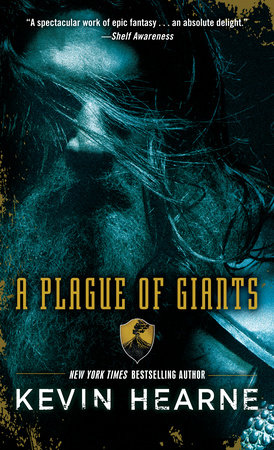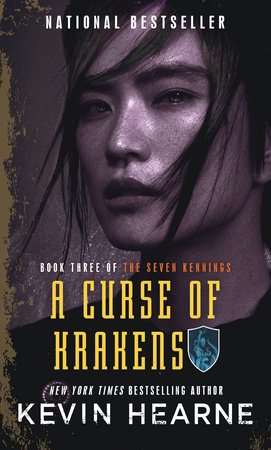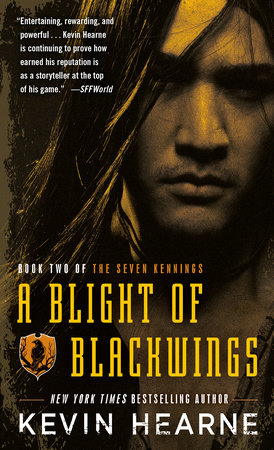Excerpt
A Plague of Giants
Day 1
The Bard Begins
When we encounter a voice that moves us on an emotional level, by turns wringing tears from our eyes and plucking laughs from our bellies, there is an ineffable quality to its power: all we know is that we like listening to it and want to hear more. But when we encounter voices we find loathsome, we usually can pinpoint why without difficulty: too nasal, too whiny, too steeped in anger or sodden with melancholy.
The bard’s voice was the ineffable sort.
He planted himself behind the battlement facing the peninsula, where the vast sea of refugees swirled around their tents, and raised his hands from his sides as if to embrace all the people who had washed up there because of the war. Then he turned slowly as he spoke, including the city in his address as well: “Good people of Pelemyn, I am Fintan, Bard of the Poet Goddess Kaelin.” At once, eyes swiveled to lock upon his form or heads tilted in the far corners of the city to hear his disembodied voice better; conversations subsided, and other magics seemed to begin their work. His beaming face elicited a kindred response and lifted moods; the cup of watery beer from a nameless keg that I had in my hand suddenly tasted like the crisp, legendary brews of Forn; pleasant aromas of fresh food were accentuated and wafted about on the wind, and the less pleasant whiffs of unwashed bodies and rotting garbage faded away.
“It is my life’s work to tell stories,” the bard continued, his smile gone now and replaced with an earnest tone. “And no one else can tell you what I have seen. This great war of our time has indeed been terrible, and I am still struck with its horrors, waking up in the night sweating and—well, I am sure I don’t have to tell you.”
No, he didn’t. Most of the people on Survivor Field were still wearing the same clothes they’d been wearing when they’d had to flee their homes. They were all dirty and ragged now, and purple hollows lay under their eyes, testament to lost sleep, lost loved ones, just . . . loss.
“But I am also struck by the sudden heroism of people all across the continent. For I have come from the other side of it, the western front, where I participated in the great battle below the Godsteeth.” A tide of exclamation greeted that announcement, and I marveled that it came from far out on the peninsula and from the streets of the city as well. He was not shouting—his volume was what one might use for a toast at a fair-sized dinner party—yet no one had difficulty hearing him.
“Yes, I witnessed that and much more. I can tell you exactly what happened in the Granite Tunnel—” Here the people sent up another cheer. “—and I can reveal that a peace-loving citizen of Kauria, acting at the behest of Mistral Kira, long may she reign, has had a secret role to play in this war and indeed may have finally found a way to bring it to an end. It is why I am here now.” That earned him the loudest roar yet, and he nodded at Survivor Field, assuring them that what he said was true. “Friends, I have permission from the pelenaut to tell you that there is a fleet on its way here from Kauria this instant. And it is coming to pick up the two allied armies that are marching this way across the mountains—one from Rael and one from Forn—and together they will sail across the ocean with your own forces to answer the enemy in kind for what they have done to us!”
The emotion that news tore from the throats of the assembled would have drowned out even the power of his kenning. It was angry at first, not directed at him but at distant shores, a tide of people who had lost almost everything and hungered for a balancing of the scales, and then it lightened, morphing into jubilation as people felt hope for the first time in months. They hugged one another, danced in the mud, tears streaming down their faces as they punched the air with their fists, for it was good news at last instead of another dose of despair, and I was not immune to those feelings. I lost track of the bard for a few minutes as I surveyed Survivor Field and then crossed to the other side of the wall and saw the same celebration happening in the streets of the city.
People skipped out of the buildings to embrace and smile and savor the sight of teeth that weren’t bared in a snarl or a cry. I could not see my own house from the wall, but I imagined that even Elynea might be grinning right then, and I was sorry to miss it; she had never looked anything but haunted since she and her children had come to live with me. And when the bard spoke again, his voice cutting through the noise as people were trying to find their second wind, he was no longer standing on the wall, half hidden by the crenellations, but was up on an improvised stage a few mariners had cobbled together out of crates. “But our relief and the enemy’s defeat will not arrive tomorrow or even the next day. It will take time for it to get here and even more time to prepare the voyage. I am told it could be up to sixty days. In the meantime, the pelenaut thinks it wise that you all hear what has happened elsewhere, for it is doubtful you have heard more than rumors. He has asked me to share what I know with you all, and he is listening as well. I am therefore engaged in your service, and I will tell you the tale in the old way, performing each afternoon until the sun sets. I hope you will take heart, as I have, from the small victories against overwhelming odds, all of which allow us to be here today, to be here tomorrow, and, gods willing, generations hence, to tell these stories again.”
The bard had to pause here for another swell of applause, and while he did, a young woman stepped onto the stage of crates with a giant flagon and presented it to him, speaking a few words in his ear that did not carry like the bard’s voice. Fintan dipped his head in thanks to her, and then his voice floated again on the wind.
“It seems that Brynlön’s reputation for generosity is well deserved! Master Yöndyr, owner and brewmaster of the the Siren’s Call in the city, gives me a flagon of Mistmaiden Ale—purely medicinal, I’m sure—and lodging at his inn for the length of my engagement! Thank you, sir!” Appreciative noises were directed at Yöndyr for having such excellent sense, and I imagined that other inn owners were cussing themselves for not thinking of it first; the Siren’s Call had just received the best advertising possible. Smiling as he did so, Fintan took the opportunity to tip the flagon and then wipe the foam from his upper lip. He then returned the flagon to the woman and wrapped himself in an air of dramatic doom, saying, “Listen.” Everyone I could see on either side of the wall stood rapt, many of us grinning at him in anticipation despite the fact that he had advertised details of a war we already knew too well. It didn’t matter because we were all children again, waiting to be told a story, and we had hope now that it would end well.
“Like all tales worth the telling, I shall begin at the beginning—but your beginning, not Kauria’s or Forn’s or anyone else’s. We’ll get to them later. We’re going to start with the reason this city still stands—your own tidal mariner! So take some time, friends, wherever you are. Fill your cups, visit the privy, do what you must so that you can be free in a few minutes to bend an ear for my tale—come closer to the wall so you can see me if you are out of my sight! If you’re thirsty, I can confirm that Yöndyr’s Mistmaiden Ale can slake a thirst like nothing else! I’ll begin soon!”
An afternoon of entertainment with one of our own featured as the heroine? Maybe with snacks and beer? We couldn’t wait! Everyone began to move and talk at once, and there was a general rush for food and drink on either side of the wall, all other occupations forgotten. Master Yöndyr, no doubt, was delighted.
“Let us begin,” Fintan said, his voice spreading effortlessly across the city and the peninsula a few minutes later. “I’d like to invite someone very special up here: Pelemyn’s tidal mariner, Tallynd du Böll. Tallynd, please join me.”
A woman in a military uniform stepped onto the makeshift stage with Fintan to thunderous applause, favoring her left leg as she did so. She had insignia that I had never seen before, which I at first assumed was due to her blessing but which I learned later meant a new military rank. She had kind eyes, a weary smile, and close cropped hair going gray at the temples. She waved to the refugees on Survivor Field, and Fintan indicated that she should speak.
“Say something. I’ll make sure they hear you.”
“Oh. Well, hello?” Her voice carried for a league thanks to Fintan’s kenning, and she received cheers in response. “Wow. Okay. I want everyone to know that I have shared both my duty log and my personal thoughts with Fintan prior to this. Except I’m sure he will organize it all much better than I ever could or did. Anyway: it’s the truth of things, and I’m glad that he will tell it all. It’s not the sort of tale you may be thinking it is right now. And you should know it.”
Fintan pulled out what looked like a small black egg from a pouch tied to his belt and held it up between his thumb and forefinger. He cast the egg at his feet, and black smoke billowed up in a column, shrouding his body completely until his form resolved into an exact copy of Tallynd du Böll, uniform and all, growing a couple of inches in the process. Fintan was a fairly short, dark man—his skin not quite as dark as that of we Brynts—distinguished by an overlarge nose perched above a generous mouth in a narrow face. It was therefore quite a shock to everyone to see him transform into the distinguished savior of our city, stand right next to her, and say with her voice, “Thank you, Tidal Mariner.”
She gasped—everyone did, honestly—and she said, “Oh, drown me, do I really look and sound like that?” Laughter from the crowd. “Never mind. Thank you, Fintan.” She waved again and stepped off the stage, and the bard told us, as Tallynd, what really happened the night the giants came.
Before my husband died five years ago, in a moment mellowed by drink and the puff of a Fornish gourd bowl, he asked me what price I thought we would all pay for the peace we’d enjoyed for so many years.
“What are you talking about?” I asked him. We were sitting in our small fountain court behind our house, and I was idly using my kenning to curl the water in twirling spirals before they dropped into the reservoir below. He hunched forward, leaning elbows on knees, and withdrew the pipe from his mouth, squinting through the smoke and waggling the stem at me.
“You have been in the military for what, four years now? And you have yet to fight a single battle. There’s always a price to be paid for that.”
“Why must we pay it?” I countered. “Perhaps the price was already paid by those who came before us.”
He bobbed his head to either side, admitting the possibility. “Perhaps you’re right,” he said. “We read all those stale histories in school, you know, and I don’t doubt that they scrubbed away a whole lot of blood and pain. Countless tragedies happening to families like ours, all reduced to a sentence or three, while pages were devoted to what this ruler ate or what that rich person wore.” He snorted smoke through his nostrils. “But I still think we have it coming to us, love. And I worry about it. Because when it comes, you’ll be the first to greet it.”
I laughed at him then. I did! I remember it so clearly now, though it didn’t seem important then. Because in that time, in that place, when he was so handsome and I wanted to have another child with him, when the sun was setting and bronzed his beautiful dark face, I could not conceive of war. I could not conceive of it, in fact, right up until it came to me first, just as he said it would. But by the time it came, he was long returned to the ocean, and our two boys were eight and nine and barely remembered him. I thought that was the worst tragedy in the world until the Bone Giants sailed over my head.
Normally I’m on duty during daylight hours, but by request of the fisher clave I was mapping the crab beds and taking note of the feeding habits of other nocturnal species in the waters north of the peninsula, keeping an eye out as always for any ship-sinking predators. I was in deep water far offshore when I heard, or rather felt, the slicing of keels through water on the surface at moonrise. It was an anomaly since no boats should have been in the area during the course of my mapping. Even allowing for fishermen who ignored the boundary buoys, it was far too much turbulence for one or two rogue net trawlers. I rose to investigate.
During the ascent, I realized the number of keels was not merely an unusual grouping of boats but a massive fleet of transport ships of strange origin. Upon breaking the surface, I saw that they definitely were not a Brynt fleet. Nor were they of Raelech or Kaurian construction or any recognizable profile. They were broad-bottomed sailing ships outfitted with oars, though at the moment they were under full wind from the east. The decks mounted no harpoons or other visible weapons. They were, however, packed with people. Tall, thin people with bone armor on their torsos and arms. They looked like ribs. I also saw handheld weapons, swords of some kind. They all had them, and they were all looking ahead at the firebowls atop the walls of Pelemyn and the smaller lamps along the docks.






